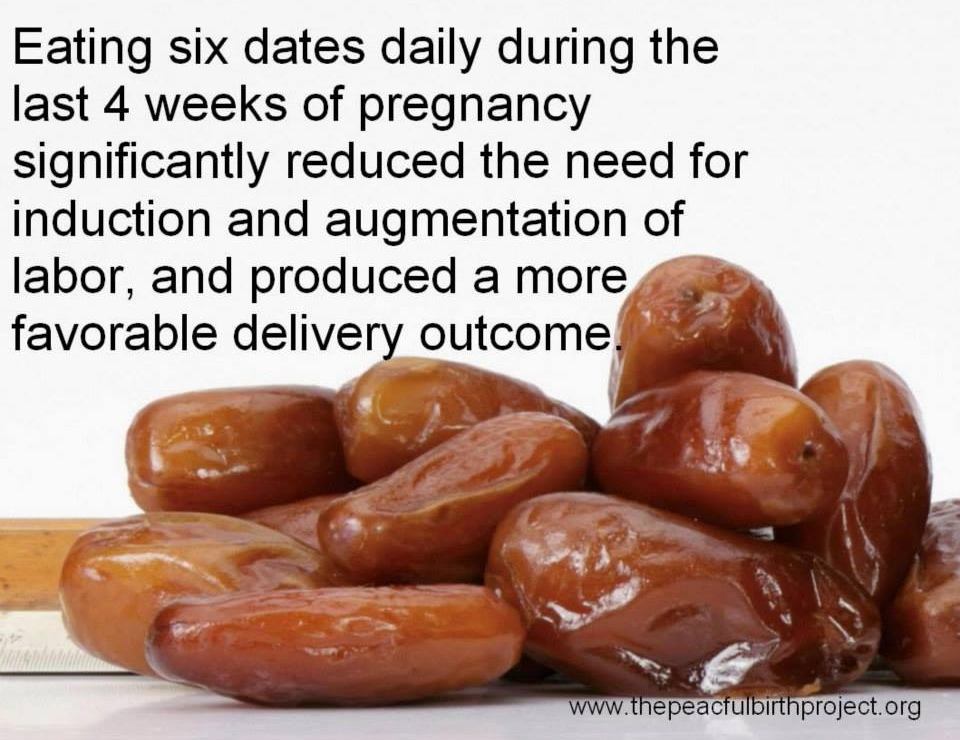Amazing Fruit Eases Labor and Prevents Postpartum Hemorrhage

A study published in the Journal of Obstetrics and Gynaecology concludes that eating 6 dates daily during the last four weeks of pregnancy “significantly reduced the need for induction and augmentation of labor, and produced a more favorable delivery outcome.”
Some significant findings:
- Cervical dilation was significantly greater in the date-eating mamas upon arrival at the hospital
- 83% of mothers who consumed dates had their membranes intact admission at the hospital
- 96% of the women who ate dates went into labor on their own
- Women who ate dates used significantly less Pitocin (synthetic Oxytocin) (28%), compared with the non-date fruit eaters (47%)
- The latent phase of the first stage of labor was almost 7 hours shorter in the date-eating mothers compared with the non-date fruit eaters (510 min vs 906 min). Not bad for eating a few dates!
The date fruit is the product of the date palm, a tree native to Northern Africa and the Middle East. There is a wide variety of dates including the better known Medjool and Deglet Noor.
Each variety is unique in size, sweetness, flavor, and texture. Containing at least 15 minerals such as potassium, calcium, iron, magnesium and zinc, 23 types of amino acids, vitamins, carbohydrates, protein, 14 types of fatty acids, dietary fiber and a lot more, these sweet little fruits are a nutritional powerhouse. [International Journal of Food Sciences and Nutrition, 2003]
Eating Dates and Reduction of Postpartum Bleeding
I also came across a very interesting research Comparing the efficacy of dates and oxytocin in the management of postpartum hemorrhage. The study demonstrates a significant reduction in the amount of postpartum bleeding experienced by women who consumed date fruit compared to women who received synthetic oxytocin (Pitocin).
The randomized clinical trial was done in two hospitals. Immediately after the delivery of the placenta one group was give 50 gram of dates. Another group received 10 units of synthetic oxytocin in an intramuscular injection. Blood loss mean in the end of first hour after delivery were significantly different in dates and oxytocin groups (104 ml vs 141.6 ml)
Conclusions: Use of oral dates after delivery decreases bleeding more than intramuscular oxytocin and it´s a good alternative in normal delivery
The researchers suggest that dates are effective for management of postpartum hemorrhage because dates have Calcium, serotonin, tannin, linoleic acid, enzimes, iron and other nutrients beneficial to control bleeding and prevent anemia. Khadem, Sharaphy, Latifnejad (2007)
More Recent Research
Since I first published this post in 2013, more research supports the benefits of eating dates in late pregnancy.
In 2014 the Journal of Midwifery & Reproductive Health published a study that concluded:
…cervical dilatation was higher in women consuming date fruit, compared to the non-consuming group. Since date fruit is full of energy and nutrients, it is recommended for pregnant women to help with cervical ripening, particularly in the last weeks of gestation.
The mothers in the study demonstrated:
- Higher Bishop score at admission to their birthing place which indicates higher cervical ripening and increased likelihood of vaginal delivery
- Greater cervical dialation
- When induced, the success rate of labor induction was higher
The researchers also noted:
It seems that date fruit influences oxytocin receptors, stimulates the uterine muscles to respond more comfortably to oxytocins, and better prepares the uterus and cervix for delivery. Date fruit has oxytocin-like effects and its nutritional and therapeutic characteristics reduce postpartum hemorrhage; it can also be a suitable alternative for oxytocin.
In 2017 another study was published by the Journal of Obstetrics and Gynaecology that supports previous findings:
Therefore, dates consumption in late pregnancy is a safe supplement to be considered as it reduced the need for labour intervention without any adverse effect on the mother and child.
Ancient Wisdom
These studies are yet another confirmation of the priceless legacy of ancient wisdom. Since the beginning of time, women have been using food, teas, oils, poultices and herbs to ease the pains of labor, heal during postpartum and support breastfeeding. Eating dates has been emphasized during pregnancy and after delivery in many Islamic traditions.
The Quaran tells of Mary eating dates in labor:
The pains of labour drove her to the trunk of a date-palm. She [Mary] said, “Oh if only I had died before this time and was something discarded and forgotten!” A voice called out to her from under her, “Do not grieve! Your Lord has placed a small stream at your feet. Shake the trunk of the palm towards you and fresh, ripe dates will drop down onto you. Eat and drink and delight your eyes… (Qur’an, 19:23-26)
Dates are also said to increase sexual stamina, help lower LDL (bad) cholesterol and lower blood pressure. Dates have been used for thousands of years by athletes to improve physical endurance, agility, and stamina.
So start eating your dates and have them handy during labor!
How to Eat More Dates
- These Raw Vegan Chocolate Truffles are delicious, nutritious and super easy to make.
- Raw Lärabars is another fast, easy and nutritious way to eat more dates
- Add them to smoothies instead of other sweeteners
- Remove the pit and fill them with your favorite nut butter
VIDEOS
NOTE: In 2013 I posted this photo on Facebook about the beneficial effects of eating dates during the last weeks of pregnancy. To my
First published in The Peaceful Birth Project website in 2003. Revised and
Subscribe for More Great Articles!
Read the latest posts from Evelyn and feel inspired to get clear, reach your goals and experience your best life.
